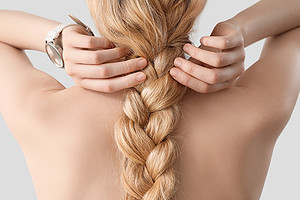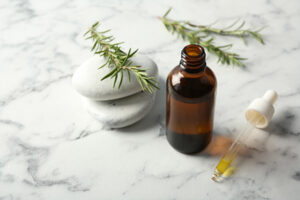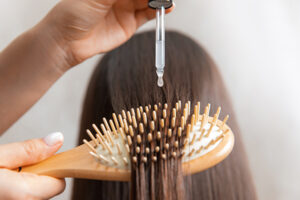Sesame seeds are a boon for the hair. These little white seeds are produced mainly in South East Asia and are widely used, especially during the Indian festive season, where sesame seeds and Indian molasses (gur) are combined to prepare sweets that are consumed in huge quantities.
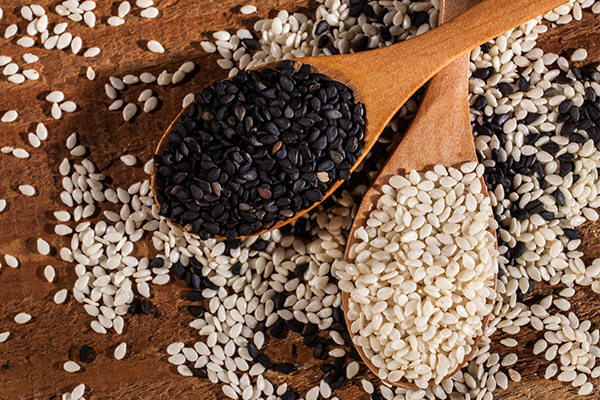
Sesame seeds are abundant in omega fatty acids, which nourish the hair, improve hair growth, and blacken white hair, especially black sesame seeds. (1)
Moreover, sesame seeds have good moisturizing properties for the scalp and aid in blood circulation, stimulating hair follicles to produce healthy hair. A 2010 research study showed that consuming sesame seeds helps to prevent hair loss. (2)
Furthermore, sesame seeds possess antiaging properties and can prevent premature graying of hair as they contain antioxidants, vitamins, minerals, tocopherols, and lignans including sesamin and sesamolin. (1)
Article Contents
How Do Sesame Seeds Improve Hair Growth?
Sesame seeds help in hair growth as they are rich in minerals including copper, phosphorus, zinc, and iron. (2) They are also a great source of protein, vitamin B1, and fiber, (1) which help manage hair fall.
Moreover, sesame seeds are full of fatty acids, namely, omega-3, omega-6, and omega-9, which are essential for hair growth.
When you massage your scalp with warm sesame seeds, the sesame oil penetrates the hair shaft and the massaging action aids in blood circulation to the follicles. (3)(4)
Hydrating sesame oil can also be used to control the dryness and flakiness due to a dry scalp. Sesamin is the primary compound in sesame seeds that researchers have used to develop sesame oil to treat hair loss. (3)
Sesame seeds act as a defense for the hair by protecting it from the harmful UV rays. (5)
Ways to Use Sesame Seeds for Hair Growth
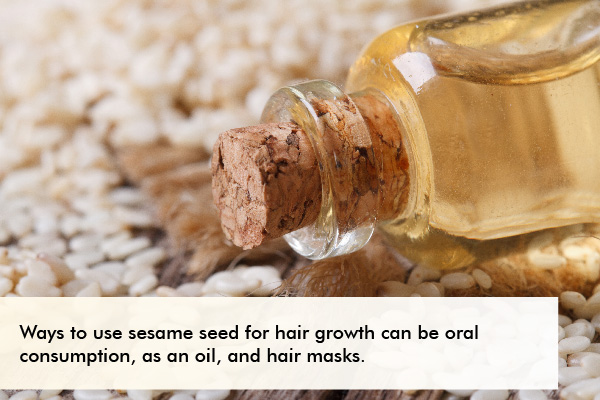
The beneficial effects of sesame seeds on the hair can be reaped in the following ways.
1. Oral consumption
Sesame seeds can be beneficial for the body and hair if consumed orally.
The estimated daily intake of lignans from sesame seeds and sesame oil is 18.39 mg/person/day for males and 13.26 mg/person/day for females in the age group of 30 and 49 years. (6)
The recommended dose is 1–2 tablespoons of sesame seeds or ¼–½ teaspoons of sesame seed powder daily.
2. Hair oil
A great way to optimize the use of sesame seeds for the hair is to use them as oil.
How to use:
- Warm 1 teaspoon of sesame seeds in a carrier oil such as coconut or olive oil.
- Strain the oil and massage it on your scalp and hair for 5 minutes.
- Cover your head with a warm wet towel and keep it for 30 minutes.
- Wash your hair with a natural shampoo and conditioner.
- Repeat this process twice a week to see results.
3. Hair masks
Sesame seed oil can be used in hair masks and other ingredients to boost hair growth and quality.
How to use:
- In a bowl, combine 1 tablespoon of sesame seed oil and 1 teaspoon of fenugreek powder.
- Apply this paste to your scalp and hair.
- Leave it on for 30 minutes.
- Wash it off with a natural shampoo and conditioner. (3)
Types of Sesame Seeds
There are two types of sesame seeds: white and black.
Black sesame seeds have their outer skins, while white sesame seeds are without their outer skins. For this reason, black sesame seeds can be bitter and are nuttier in comparison to white sesame seeds. (7)
Which Type of Sesame Seeds Are Better for the Hair?
Both sesame seed varieties are suitable for the hair as they are rich in vitamins and minerals.
However, researchers observed that vitamins E, K, and C were higher in white sesame seeds, while vitamins A and B were higher in black sesame. It was also observed that white sesame seeds were richer in protein, fat, and moisture content than black sesame seeds. (8)
Thus, white sesame seeds are preferable for hair growth to black sesame seeds. (9)
Which Is Better: Sesame Seeds or Sesame Seed Oil?

Both sesame seeds and sesame seed oil are rich in nutrients and antioxidants. (10) Sesame seed oil is abundant in omega-6 fatty acids but lacks omega-3 fatty acids. (11)
It also has antifungal and anti-inflammatory properties. Using it to massage the scalp helps to improve blood circulation and hair growth.
Side Effects of Using Sesame Seeds on the Hair
Some people are allergic to sesame seeds and oil, and even some infants have been found to exhibit allergies to it.
A study in the UK found that allergy to sesame seed was seen in 0.42% of children and 0.04% of adults. (12) It is also advised that if you have diarrhea or fever, you should avoid eating black sesame seeds. (13)
General Queries Related to Sesame Seeds for Hair
Can raw sesame seeds be consumed?
You can safely have 1–2 tablespoons of raw black or white sesame seeds; they may taste bitter and pungent. (7)
Is sesame oil more beneficial than sesame seeds for the hair?
Sesame seed oil is produced from sesame seeds, and it is helpful to nourish a dry scalp and fight against dandruff. (2)
Final Word
Sesame seeds are not only excellent for your body, but they are also equally nourishing for your hair and scalp. They may look small but they contain nutrients, antioxidants, and essential fatty acids.
Sesame seed oil helps deep condition, darken, thicken, and regrow hair. But before you use it on your scalp and hair, you should perform a patch test first to check if you are allergic to it.
References
- Pathak N, Rai AK, Kumari R, Bhat KV. Value addition in sesame: A perspective on bioactive components for enhancing utility and profitability. Pharmacognosy reviews. https://www.ncbi.nlm.nih.gov/pmc/articles/PMC4127822/. Published July 2014.
- Nutritional, medicinal and industrial uses of sesame (sesamum indicum L … https://www.researchgate.net/publication/50870025/.
- 5α-reductase inhibition and melanogenesis activity of sesamin from … https://www.researchgate.net/publication/281996352/.
- Dubey K, Joshi HM. IMPORTANCE OF SESAME OIL IN HERBAL OIL FORMULATION: A REVIEW ARTICLE. undefined. https://www.wjpls.org/download/article/21112017/1511954604.pdf. Published January 1, 1970.
- A review on nutritional and nutraceuticals properties of sesame … https://www.researchgate.net/publication/269695123/.
- Kim A-Y, Yun C-I, Lee J-G, Kim Y-J. Determination and daily intake estimation of Lignans in sesame seeds and sesame oil products in Korea. Foods (Basel, Switzerland). https://www.ncbi.nlm.nih.gov/pmc/articles/PMC7230771/. Published March 30, 2020.
- (PDF) black sesame seeds information – researchgate. https://www.researchgate.net/publication/334596458/.
- Kanu PJ. Biochemical analysis of black and white sesame seeds from China. Science Alert. https://scialert.net/fulltext/?doi=ajbmb.2011.145.157. Published December 27, 2010.
- Wang D, Zhang L, Huang X, et al. Identification of nutritional components in black sesame determined by widely targeted metabolomics and traditional Chinese medicines. Molecules (Basel, Switzerland). https://www.ncbi.nlm.nih.gov/pmc/articles/PMC6100530/. Published May 15, 2018.
- Sesame Seed. Sesame Seed – an overview | ScienceDirect Topics. https://www.sciencedirect.com/topics/agricultural-and-biological-sciences/sesame-seed.
- Yadav R, Kalia S, Rangan P, et al. Current research trends and prospects for yield and quality improvement in sesame, an important oilseed crop. Frontiers in plant science. https://www.ncbi.nlm.nih.gov/pmc/articles/PMC9120847/. Published May 6, 2022.
- Sesame Seed Oil. Sesame Seed Oil – an overview | ScienceDirect Topics. https://www.sciencedirect.com/topics/nursing-and-health-professions/sesame-seed-oil.
- DA; KGDHCM-V. Sesame seed and sesame seed oil contain masked allergens of growing importance. Allergy. https://pubmed.ncbi.nlm.nih.gov/9020427/.


